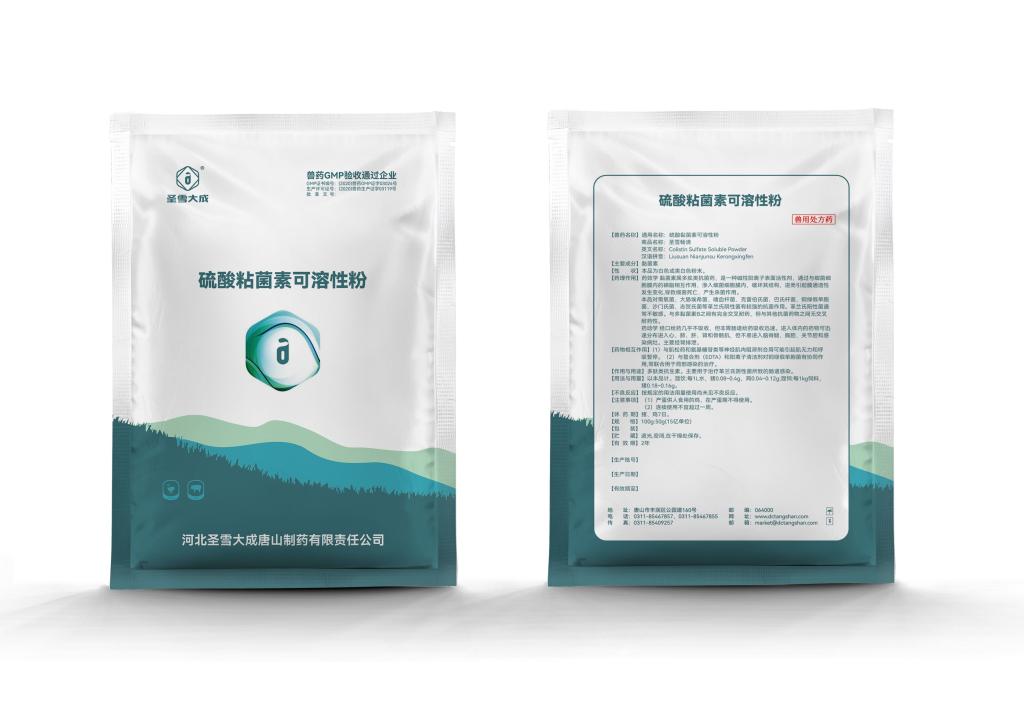Tel:+8618231198596

News
 CONTACT
CONTACT
 CONTACT
CONTACT
- Linkman:Linda Yao
- Tel: +8618231198596
- Email:linda.yao@dcpharma.cn
- Linkman:CHARLES.WANG
- Department:Overseas
- Tel: 0086 0311-85537378 0086 0311-85539701
News
Current Position:
Home >
News
>Responsible Use Guidelines: Colistin Sulfate Soluble Powder in Livestock Farming.
Responsible Use Guidelines: Colistin Sulfate Soluble Powder in Livestock Farming.
TIME:2024-01-17
Understanding Colistin Sulfate Soluble Powder
Colistin Sulfate is an antibiotic from the polymyxin class, primarily used to treat bacterial infections in livestock. Its effectiveness against gram-negative bacteria makes it a valuable tool in disease management. However, the overuse or misuse of Colistin Sulfate poses significant risks, including the development of antibiotic-resistant bacteria.
Responsible Use Guidelines
Veterinary Oversight and Diagnosis
a. Veterinary Prescription: Colistin Sulfate should only be used under the supervision of a qualified veterinarian. A prescription is essential to ensure that the medication is administered at the correct dosage and duration.
b. Disease Diagnosis: Before prescribing Colistin Sulfate, veterinarians should conduct thorough diagnostic tests to identify the specific bacterial strain causing the infection. This targeted approach helps optimize treatment efficacy and reduce unnecessary antibiotic use.
Dosage and Administration
a. Accurate Dosage: Administer Colistin Sulfate at the prescribed dosage, taking into consideration the weight, age, and health status of the animals. Overdosing or underdosing can contribute to antibiotic resistance and compromise treatment effectiveness.
b. Proper Administration: Follow proper administration procedures, whether through feed, water, or injection, as recommended by the veterinarian. Adherence to administration guidelines helps ensure uniform distribution and absorption of the medication.
Monitoring and Withdrawal Periods
a. Regular Monitoring: Regularly monitor animals undergoing treatment with Colistin Sulfate for any signs of adverse reactions or lack of improvement. Promptly report any concerns to the veterinarian for reassessment.
b. Withdrawal Periods: Adhere to withdrawal periods specified on the medication label. This ensures that the antibiotic has sufficiently cleared from the animal's system before the meat or other products enter the food supply, reducing the risk of antibiotic residues.
Record Keeping and Traceability
a. Maintain Detailed Records: Keep accurate and detailed records of all Colistin Sulfate treatments, including the date, dosage, administration route, and withdrawal period. This information is crucial for traceability and facilitates transparency in farming practices.
b. Tracking Antibiotic Use: Implement systems to track overall antibiotic use on the farm. This data can inform decision-making processes, enabling farmers to assess the efficacy of treatment protocols and identify areas for improvement.
Responsible Farm Management
a. Biosecurity Measures: Implement and maintain robust biosecurity measures to prevent the introduction and spread of diseases within the farm. A proactive approach to disease prevention can reduce the need for therapeutic antibiotic use.
b. Rotational Grazing and Housing: Implement rotational grazing practices and provide adequate housing to minimize stress on animals. A stress-free environment contributes to overall animal health and reduces the susceptibility to bacterial infections.
Education and Training
a. Farmer Training: Provide ongoing education and training for farmers and farm workers on responsible antibiotic use, disease prevention, and animal welfare. Informed and trained individuals are more likely to make responsible decisions regarding livestock health.
b. Public Outreach: Engage with the local community and consumers to communicate responsible antibiotic use practices. Building awareness fosters understanding and support for the agricultural industry's commitment to animal welfare and public health.
Collaboration with Stakeholders
a. Collaboration with Veterinarians: Foster collaborative relationships with veterinarians to promote responsible antibiotic use. Regular communication ensures that farmers have access to the latest information and guidelines related to Colistin Sulfate and other veterinary medications.
b. Industry Collaboration: Collaborate with industry organizations, researchers, and policymakers to stay informed about best practices, research findings, and regulatory developments. A collective effort is essential to address antibiotic resistance on a broader scale.
Challenges and Opportunities
Challenges of Responsible Use
a. Economic Pressures: The economic realities of farming may pose challenges to implementing responsible use practices. Balancing financial considerations with responsible use requires strategic planning and support.
b. Limited Access to Veterinary Services: Some farmers, especially in remote areas, may face challenges in accessing veterinary services. Efforts should be made to bridge this gap through outreach programs and telemedicine initiatives.
Opportunities for Improvement
a. Research and Innovation: Continued research and innovation in veterinary medicine can lead to the development of alternative treatments and practices that reduce reliance on antibiotics.
b. Consumer Awareness: Increasing consumer awareness and demand for responsibly produced food creates opportunities for farmers to adopt and showcase responsible antibiotic use practices.
Conclusion
Responsible use of Colistin Sulfate Soluble Powder in livestock farming is a shared responsibility among farmers, veterinarians, policymakers, and consumers. Adhering to guidelines that prioritize animal health, mitigate antibiotic resistance, and promote sustainable practices is essential for the long-term viability of the agricultural industry. By embracing responsible use, the livestock sector can contribute to a healthier environment, ensure the safety of the food supply, and meet the evolving expectations of a conscientious consumer base.
- Tel:+8618231198596
- Whatsapp:18231198596
- Chat With Skype







